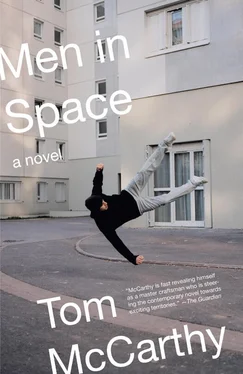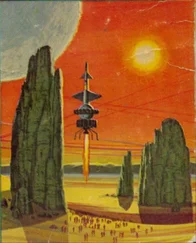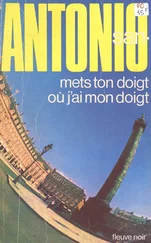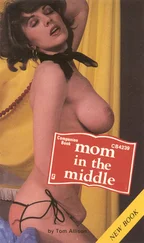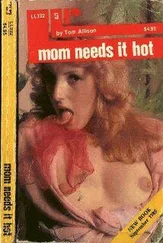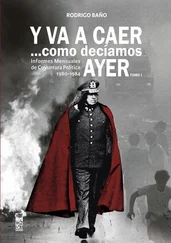Ivan Maňásek rises from his chair and, without saying goodbye to the others, glides through the bar and out into the street. It’s not even night any more: the overcast sky’s beginning to glow an electric grey, its clouds absorbing and intensifying light, bouncing it back onto the bare trees in the park at Karlovo Náměstí, the grass below them, the grey concrete of the path and pavements and the orange clay walls of St Ignatius’s. She’ll be here, somewhere among this luminous murk, bathing in it: she’ll be hovering, like succubi in paintings, over some corporeal woman who’s at this very minute showering or eating breakfast or leaving her flat for work … He’ll find her, track her down: it’s just a case of following the energy. His finger tingles more intensely than before. He walks down Na Moráni, towards Palackého Most. His flat’s just on the far side, on Lidická. Two, three nights ago, walking across this bridge, Ivan paused at a spot where the stone balustrade curves out to form a rounded platform, and noticed hundreds of seagulls sleeping on the Vltava. He looked down at them for a while, then clapped his hands as loudly as he could and watched the oily surface of the river erupt into white whirls that expanded upwards around his head — expanded outwards too, above the river’s surface halfway to the next bridge along as more birds, woken by the flapping of the birds he’d woken, took off: a chain reaction. He liked it so much that he went home and dragged his flatmate Nick out to show him. Now the air’s empty of birds, full of grey brightness. On the hillside above Malá Strana he can see the Poor Wall rising up Petřín towards the Strahov Tower and, to its right, the Castle, this endless stretch of green and yellow architecture poised above the city; below it, closer, the white towers of Mánes, the gold roof of the National Theatre; to the left, grey latticework of the Smíchov Railway Bridge, skeletal spires of St Peter and Paul’s. She’ll be in here somewhere, hiding in some … fold … yes, in some fold between these points strung out along contours of hill, valley and river …
A number eighteen’s snaking its way round the corner into Palackého Náměstí, pulling up now beside him, unoiled brake pads screeching, doors accordioning open. Inside its second carriage, through a trellis of anonymous arms and necks and torsos, he can see a young woman sitting. He can’t see her face, but he just feels, he knows, the air itself is shouting out to him that she’s some kind of conduit. Ivan jumps in and slides into a seat a man has just vacated three rows behind her. She’s dressed and coiffured like your typical secretary, bank clerk, shop assistant: artificially waved hair, burgundy felt coat covering back and shoulders, imitation leather Maj or Kotva handbag lying on her lap. Ivan’s fingers gently stroke the air; three rows in front of him, the woman’s body tenses: must be her … She rises from her seat, walks to the door; he slides out from his seat too, follows her …
The tram stops back at Karlovo Náměstí. They both get out. The tingling’s unbearably intense now: Ivan’s excitement’s straining out towards her, pushing at the fabric of his trousers. They cross the park, past two globed climbing frames, a faded hopscotch court drawn on the ground in chalk, a slide … The path curves round some bushes, then — where’s she gone? She can’t have been more than eight metres in front of him, and now she’s vanished … But the tingling’s still there. The girl in the red coat — the guide, the message-bearer — may have disappeared but she ’s still here, somewhere very close by … The park’s ended now; the pavement’s dropping sharply, as it carries him down Vyšehradská, from a balustrade on which a worn stone angel stands holding a staff. The angel’s breasts swell in her undulating shirt. From down here, Ivan can see up between her skirt’s folds, up her legs. If he climbs these steps towards her, ducks behind this wall — away from the trams hurtling down the hill, the medical students going to work on Betonska and Apolinářská — he’ll be able to …
And yes, he feels her presence as he unzips, knows she’s covering the worn and spongy stone like moss or dew, running in a sub-electric current round the angel’s waist, her neck, her head. He points up at her, way up, pointing through her to heaven, to whatever’s highest … Segments of leaf and woods and stars flash through his mind, a half-bare thigh, bandannas … An ambulance shoots down the hill, its siren blaring, growing louder as it heads towards him, maybe it’s the police but it’s too late now, can’t stop: here it is, the love shooting out of him and hanging in the cold air, gravity-defying, for half a second … But it hasn’t even made it one tenth of the distance up towards the statue let alone to her before, as the siren eases off, slows down and flattens out, its arc falls back towards the ground — and there’s a shuffling behind him, someone coming up the steps, better get zipped up quickly …
Walking on down Vyšehradská, past the medical faculty, Ivan Maňásek feels exhausted, empty. More ambulances trundle by. Men and women walk past him in white coats, chatting together. They ignore him: he’s out of their loop — out of his own loop too, her loop. It didn’t work, didn’t make it up to her; the jet he shot out will be lying on concrete, grey and dead. On Na Slupi, he enters a phone box, roots around his pocket, finds some loose change at the bottom of it, feeds a one-crown piece into the slot: six-oh-four-three, no, six-four-oh-three …
The first time round he gets put through to Klárá’s neighbour. Fucking party lines. The next try gets him through to her. She has a croaky, tired voice: Ivan can almost smell the sleep on her, the moistness of her skin, her crumpled off-blond hair …
“Klárá?”
“Who’s that? Ivan?”
“Klárá. Yes, it’s me.”
“What are you calling for this early? What time is it?”
“I’m not sure.”
There’s a soft sound as the phone’s laid down, must be her duvet; then a rustling and her voice is there again: “Six-forty. Why are you …”
“Klárá, I just …” What’s he meant to say? “What’s new? I was just thinking about you.”
“I was asleep. Nothing’s new. Where are you?”
“In Nové Město. In a phone box.”
“Has something happened? Are you OK?”
“I suppose so. How are you?”
“I’m fine. I’ve got to go to work.”
“What are you doing?”
“Renovating altars. St Cajetan, in Hradčany.”
“I saw Sláva Kinček tonight.”
“And you called to tell me that?”
“Did I wake you?”
“Yes. And now …”
“And could you tell me … I’m not being rude: I really want to know …”
“What?”
“Klárá, were you dreaming anything erotic?”
There’s a pause, then a click, then a long, deep, black noise. Ivan replaces the receiver. It was three years ago. Before leaving the cabin, he fishes a tissue from his back pocket, cleans himself up. Then he pulls out Hájek’s wrap, taps a little power onto the back of his left hand and snorts it up. Fuel.
He rides trams round the city: hopping on, off, walking for a while, cutting back, looping round. After some time, he finds himself on the brim of the hill at Letná, outside the closed front doors of Pod Stalinem, the club where Milan Hájek came from earlier to meet him and Jan, where someone was saying they were going to do something, sometime … He used to come here in the days when Radio Stalin operated from inside here, decks and wires slinking haphazardly among the rubble left from when they’d blown up the giant Stalin Monument that loomed over the whole city. One of his earliest memories, that: seeing the scaffolding explode, the giant bronze head topple … Did he watch it for real or on TV? He can’t have been more than four: perhaps he’s remembering it from films, people’s accounts … Now a huge metronome rises up where Stalin stood. It’s supposed to sway in great arcs from one side to another, north to south and back again — but it’s broken, jammed, its needle sitting inert in the cold at fifty-odd degrees. His mother was ambivalent about the statue’s destruction: Iosif Vissarionovich wasn’t all bad, you know … History needs force to move it forwards; things need to be done … She went into shock when the USSR disintegrated. Looking across the city, Ivan pictures Hájek’s cosmonaut gazing down from his spaceship onto familiar land masses he no longer recognizes: whole blocks wrenching apart, accelerated continental drift, a jigsaw in reverse … And in two weeks Bohemia and Slovakia will split …
Читать дальше
